Released in June 2010 in Hong Kong and screened at several major film festivals (HKIFF, Udine Far East Film, Fantasia, NYAFF, Fantastic Fest, Vancouver, Sitges, Tokyo, Berlin Fantasy Filmfest), the kung-fu comedy " Gallants" is definitely one of the best Hong Kong movies of 2010 and was recently named Best Film of 2010 by the Hong Kong Film Critics Society. Here at last is the second and final part of an interview with one of its directors, Clement Cheng. He continues to tell us why he chose Michael Chai Wai-man as one of the main bad guys...
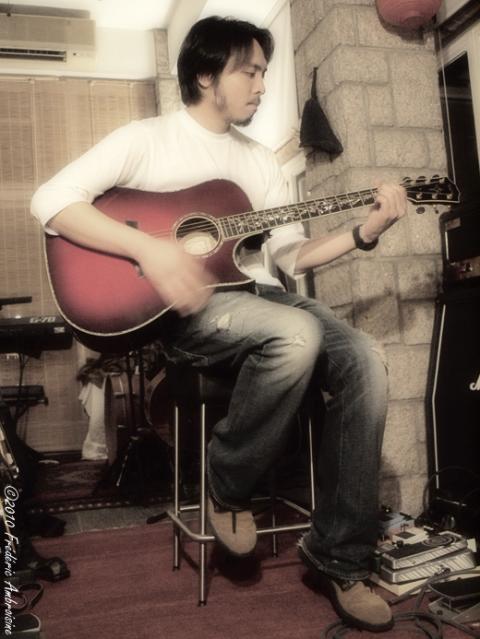 Clement Cheng(Hong Kong, April 2010)Clement Cheng:
We were trying to find the same caliber of action actors to compliment
Bruce Leung and Chen Kuan-tai. It had to be Chan Wai-man because he's
really a bad motherfucker. We really wanted to see Bruce Leung fight
Chan Wai-man but it didn't fit the theme of our movie. So as we
developed it, we thought if he does agree to play the part, he has to be
more senior in rank to reflect how Chen Kuan-tai and Bruce Leung have
never grown. They are hiding themselves in the restaurant and trying
to wait for Teddy Robin, their master, to wake up. We can look at that
situation from a different angle and on a different level, and there was
no better person than Chan Wai-man. Because everybody knows he's a
master. That is why we asked him. And he agreed to do it.
Clement Cheng(Hong Kong, April 2010)Clement Cheng:
We were trying to find the same caliber of action actors to compliment
Bruce Leung and Chen Kuan-tai. It had to be Chan Wai-man because he's
really a bad motherfucker. We really wanted to see Bruce Leung fight
Chan Wai-man but it didn't fit the theme of our movie. So as we
developed it, we thought if he does agree to play the part, he has to be
more senior in rank to reflect how Chen Kuan-tai and Bruce Leung have
never grown. They are hiding themselves in the restaurant and trying
to wait for Teddy Robin, their master, to wake up. We can look at that
situation from a different angle and on a different level, and there was
no better person than Chan Wai-man. Because everybody knows he's a
master. That is why we asked him. And he agreed to do it.
Frédéric Ambroisine: Why Lo Meng?
CC: Well, you're a Shaw Brothers fan, right? You've seen his movies.
FA: He hasn't fought onscreen for many years. How did you know he could do it again?
CC: We didn't know. But we believed. We believed he could do it. For the past ten or fifteen years he has been doing comedy stuff for television and movies. Nobody has given him a chance to really fight with his real kung fu. When we met him, he's still in really, really good shape. Every time he was fighting or he had a scene, he came up to me and says, "Um, Clement, do you think I could take off my clothes and show my muscles?" And we'd say, "Hmm...no, not for this part." I mean, how could you not love him? You have to love him!
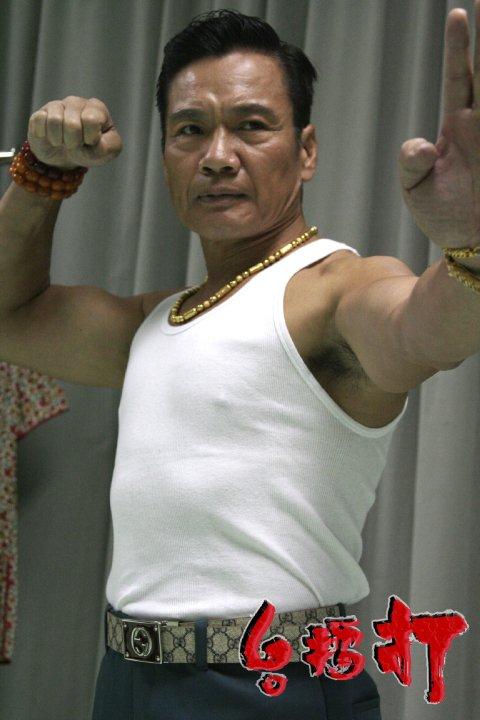 Lo Meng
As I said earlier, we
don't want to laugh at the actors themselves, we want to laugh with them
and we want to give them the chance to compliment us. And we know they
can do it. Like in "
The Pye Dog". We asked Susan [Shaw
Yin-yin] to join our cast. It was a very serious role, and for the past
fifteen or twenty years she had never played that kind of role. This
is why we believe in actors. If only they are given a chance, they can
do something extraordinary. This is what we believe in.
Lo Meng
As I said earlier, we
don't want to laugh at the actors themselves, we want to laugh with them
and we want to give them the chance to compliment us. And we know they
can do it. Like in "
The Pye Dog". We asked Susan [Shaw
Yin-yin] to join our cast. It was a very serious role, and for the past
fifteen or twenty years she had never played that kind of role. This
is why we believe in actors. If only they are given a chance, they can
do something extraordinary. This is what we believe in.
FA: Did you write her "Gallants" role especially for her?
CC: Yes. We wrote the part especially for her because we like her and we know she can deliver something new every time. But only if she is given a chance. We actually developed her role one week before we started shooting.
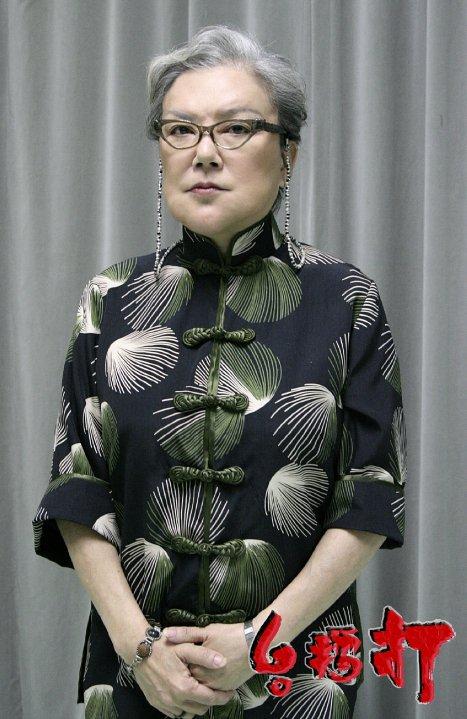 Susan Shaw Yin-yin
FA: Can you describe her character a little bit?
Susan Shaw Yin-yin
FA: Can you describe her character a little bit?
CC: Her character now is a Chinese herbal doctor. And supposedly Teddy Robin is her first love. Teddy Robin, in the movie, is a playboy. He had a wife and many girlfriends, he went to nightclubs when he was young (laughs). He's not a conventional kung fu master. When Teddy Robin went into a coma, she learned how to be a Chinese herbal doctor just to treat him. And she stayed with him for the thirty years he was in a coma. This is her character. To us, this is a very young girl thing. It's your first love, and you're really dedicated to the person that you love. You're always beside him and you get shy when he's around, and you want to look your best around the person that you love. But we thought it would be interesting, and realistic, to portray a person in her sixties having the feelings of a teenager. It's a puppy love thing. When we first thought of it, we thought it fit our theme and it might work. Not until the very end, a week before we started shooting, did we come up with her character. We had different ideas of what she could be, like a delivery person or a waitress in the restaurant. But in the end we thought, no. In " The Pye Dog" and " The Moss", she was never a beautiful girl, in her outlook. We thought this time it had to be different. She has to be decent, and a real woman this time. So everything fell into place and it's now her part.
FA: Another surprising character is played by the director Law Wing-cheong ("Running Out Of Time 2", "Tactical Unit: Comrades in Arms"). He's really good as an actor in your movie. How did you decide to cast him?
CC: Yes, he's really good! We knew Director Law for a few years and he's a very good director. He's a very serious person. But every time we saw him onscreen it was in a Johnnie To movie. He's always playing little side characters; nothing really important, nothing really outstanding. And we thought, "Hmm, his appearance is not really funny. He's a really serious person. What if we make him seriously funny?" Because they are really bad asses in the movie. But when we wrote the script, there were three brothers who are really bad people with bad hearts. But the most important thing in their heart is their family and their brothers. If one of them is injured or in trouble, the other one will come and help, but in a very stupid and crazy way. We couldn't find any actors to fill these shoes because if it was a well-known actor, he would outshine Lo Meng. But if it was a totally new person, we wouldn't care about him. So he is the perfect person. When he's in Johnny To's movies, he is always the bad guy. Always! I don't know why, but he has an image imprinted in people's minds even though they don't really know his name. So that's why we asked him. He's a very nice guy and he agreed to do it.
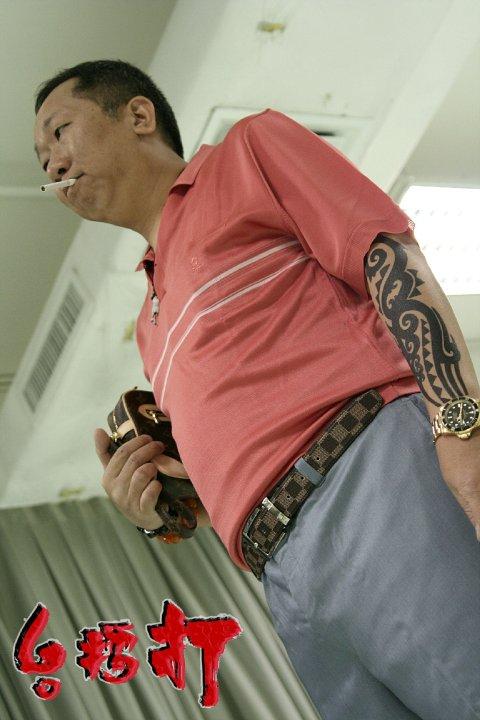 Law Wing-cheongFA: One thing I found very funny was the costume design. Law Wing-cheong's handbag is terrific!
Law Wing-cheongFA: One thing I found very funny was the costume design. Law Wing-cheong's handbag is terrific!
CC: The Louis Vuitton (laughs).
FA: I found that very, very funny. Was it written into the script?
CC: We had big help from our production and costumer designer, Silver Chung. We talked about it and he asked about their background. We said these people are from the villages, far away from cities. But they're really rich because they collect money from normal citizens and villagers. So they have money but they don't have taste. They buy the most expensive stuff. They'll line up at Louis Vuitton and at Gucci but they don't know how to match things. So Silver came up with the idea of those bags. They're supposed to be worn by very slim models, you know. When the fitting came, we were laughing our heads off. And we like tattoos. We don't have any, but Teddy has a tattoo [in the movie] that is really serious, the word says "awesome" or "powerful". In Cantonese it's not really a swear word but it's not very polite to say that word "awesome". But he's a really unconventional master. So we thought, what would the bad guys have? They would have really cheesy, bad tattoos from the 90's (laughs). So Law Wing-cheong has a tattoo [in the movie], but it's not really trendy. If you had that, you'd think, "Oh my god, I'd be dead by now. I really would laser it off." But he's still wearing it. Lo Meng initially also had a tattoo but for some reason our company thought there were too many of them and it provokes a Yakuza kind of idea and they didn't want them [the audience] to think like that because after all, this is a funny and good-hearted movie. So we erased it. The Hawaiian shirts were Silver's idea and it was really awesome. By the way, all their gold necklaces are fake (laughs).
FA: Among the new generation actors, why did you choose Wong You-nam, JJ. Jia and MC Jin?
CC: Well, the reason for Wong You-nam is very simple. He's the only young actor that has a waist size of 26 inches (laughs). And nobody else has such a thin build. He fit our profile. We immediately thought, he's been in " Ip Man" and a couple other movies. And he knows some kung fu. He knows Wing Chun. Just with that, he's the one. He looks really weak and he is really weak (laughs). He looked like a loser when we did the fitting with the hair and the glasses. If it was Lawrence [Chou], he would be too handsome for the part, even with glasses and the hair. I think underdogs can identify with his image.
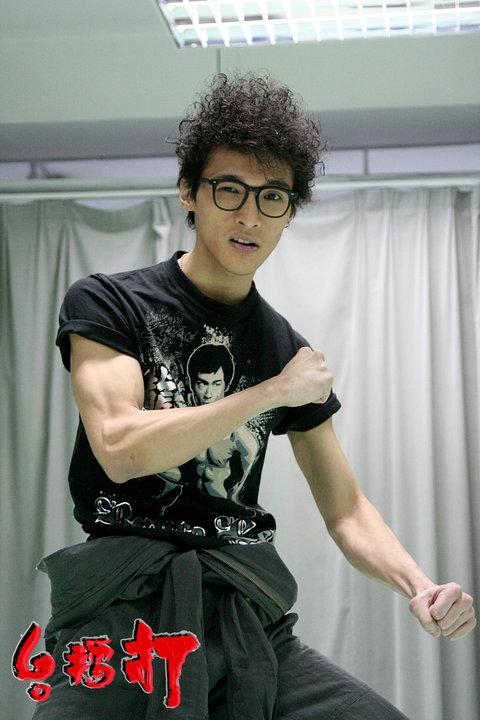 Wong You-nam
And with J.J. [Jia], it's
the same idea as with senior actors. All she did was sexy stuff, and
people made fun of her. We thought if we treated her like a normal human
being, you would see a different side of her. To my surprise, she is a
very, very good actress. Very. On several occasions, not only was she
concentrating on her own part but she reminded me that there was a
problem with what I was filming with somebody else. I think it takes
heart, concentration and dedication for an actor to come up to a
director and say, "I saw a problem in this scene you are filming." I
wasn't paying attention. She's not even in this part so she could be
somewhere else, you know, sleeping or doing something else. I really
admire her. And for the part for [MC] Jin, the person who came back
from the States, I don't know who else. Maybe Edison [Chen]? (laughs)
Wong You-nam
And with J.J. [Jia], it's
the same idea as with senior actors. All she did was sexy stuff, and
people made fun of her. We thought if we treated her like a normal human
being, you would see a different side of her. To my surprise, she is a
very, very good actress. Very. On several occasions, not only was she
concentrating on her own part but she reminded me that there was a
problem with what I was filming with somebody else. I think it takes
heart, concentration and dedication for an actor to come up to a
director and say, "I saw a problem in this scene you are filming." I
wasn't paying attention. She's not even in this part so she could be
somewhere else, you know, sleeping or doing something else. I really
admire her. And for the part for [MC] Jin, the person who came back
from the States, I don't know who else. Maybe Edison [Chen]? (laughs)
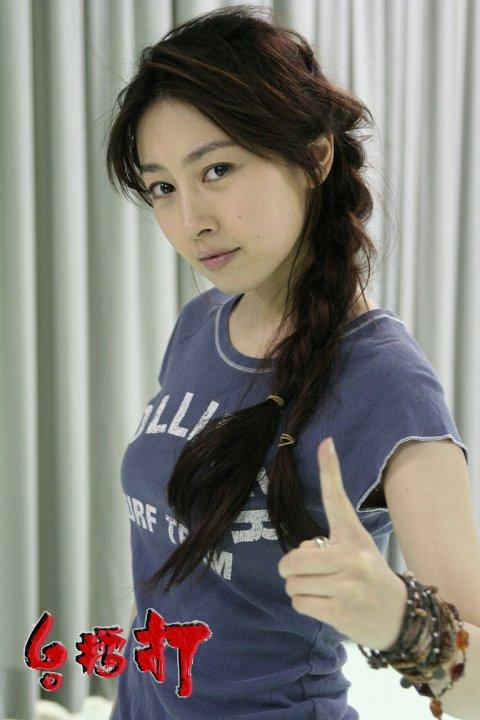 J.J. JiaFA:
What is the point of the character coming back from the States? What
did you want to show? That he lost a bit of his culture, or that he
doesn't know the traditional values?
J.J. JiaFA:
What is the point of the character coming back from the States? What
did you want to show? That he lost a bit of his culture, or that he
doesn't know the traditional values?
CC: People think that the reason people study abroad in the States, Canada, Europe or Australia, is because they have money. And they have a better education and a better vision of the world. And that when they come back, people will pay them more money, or that they know better. People think that people who study abroad are really fortunate. But our character is totally the opposite. The reason he went abroad is that he is trying to escape from Wong You-nam's character, Leung King Cheung, because he was getting beat up all the time. To him it was an escape, it wasn't something glorious. Everything has two sides to it. That's what we try to incorporate, in various ways. There's a scene where he spoke English throughout. Wong You-nam's character didn't know what he was talking about (laughs). We didn't think it was very funny, but it was funny and interesting to have it. There is one movie I like very much called " Swallowtail Butterfly", directed by Shunji Iwai. There's one scene with a Caucasian who speaks Japanese and doesn't know any English, and a Chinese person who speaks English and doesn't understand any Japanese. That cultural shock really got to me. I think Hong Kong is the same kind of place. It's a really big melting pot of all sorts of different cultures. Plus, people my age who have studied abroad and come back don't really understand Chinese, but they look Chinese. That's what we see all the time in Hong Kong and that's why we incorporated it into the character.
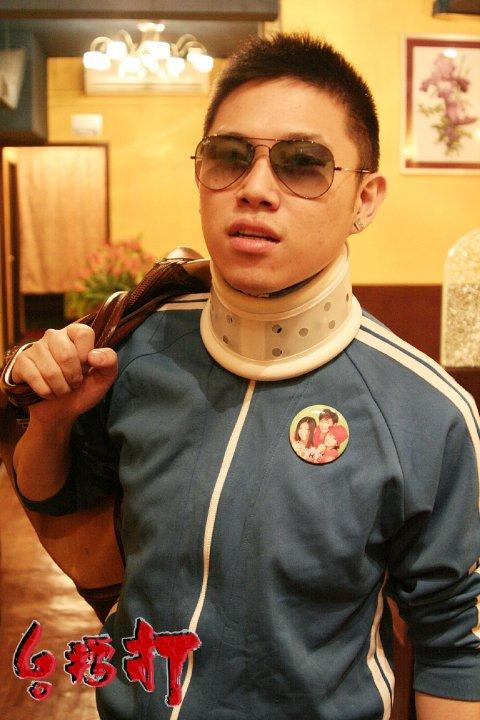 MC JinFA: The character who fights with Bruce Leung is played by Li Hai-tao. He seems to be a real martial artist.
MC JinFA: The character who fights with Bruce Leung is played by Li Hai-tao. He seems to be a real martial artist.
CC: He was a five-time champion of K-1 type fight tournaments. Oh my god, he punched me once, very lightly, and I was hurting for a week. He is really awesome. Fortunately he is a friend of our producer [Gordon] Lam Ka-tung [a regular actor in Johnnie To movies like " Election", " Exiled", " Triangle", " Mad Detective" etc.] and he was willing to help us. We thought, this is a young guy, physically fit and tall. Bruce Leung is short, with glasses, no hair and fat. So there is a big contrast. It was really difficult for him to do the fight scenes because he is a real fighter. Real fighters don't do [wide arm motions] pow pow pow pow! They do really small gestures. And he hits really, really hard. So several times he hurt Bruce Leung very much. One time he had a bruise the size of a tennis ball, I'm not exaggerating. When he hit him, Bruce went outside. He wouldn't let us see it. When he came back, maybe five minutes later, we saw it. It was a huge bruise. On camera you didn't really see it; he hit him really slowly and very gently but oh my god, the power he has is so great. It took some time for him to adjust from real fighting to film fighting. In once scene, Bruce Leung said, "Forget about choreography. We'll just do it." So he really did it. After that, he never said it again (laughs).
FA: His character is really interesting. He doesn't talk much, but on his face you see a kind of samurai, or chivalrous, spirit.
CC: Exactly. This is how we wanted to portray him. It's a contrast between him and Jin. But at the same time they are all very young and there are many things they don't understand. One is willing to learn and the other one is not. People have their own paths. They choose what they want. If they have faith or more experience, they become wiser. There is a dialogue where everybody is laughing, and Bruce Leung asks him, "Do you understand?" He doesn't answer yes or no. He's willing to listen. He could say "No, I don't" or he could say something that he made up, but Chan Wai-man says, "Don't worry about it, you will understand in several decades." People tell you stuff when you're young and you know the idea but you don't really understand. You have to go through some experience in your life and then you will understand. This is how we feel too.
FA: Eighteen days for shooting is crazy. How about post-production?
CC: Post-production started early on. We finished our first cut within three or four weeks, then we stopped for about four months because of scheduling. Focus has their own strategy on how to market the film. So we stopped for three or four months and Derek went on to make another film and I started to do " Merry-Go-Round" [co-directed by Goretti Mak Yan-yan]. In November or December we started post-production again. So maybe altogether ten weeks.
FA: The action scenes are usually the difficult parts.
CC: Very difficult. As I said before, it was because of master Yuen Tak.
FA: But once he finishes the choreography on the set, you don't hear from him anymore.
CC: The thing we have to thank him for is that he helped us edit at the very beginning, a kind of rough cut of what he was trying to do. We had such good communication. He helped us for one day and pointed us in the right direction. So we started from there.
FA: The action scenes are very old school. Now all the kung fu movies use wires and stuff like that so I was really happy to see a good, fast-paced, old school kung fu movie. Did everybody follow you on this? For example, did the producers say you should use this or that effect? Or did you do it your way?
CC: Like you, Derek and I are really hungry for old school kung fu fight scenes. Naturally we wanted to do that. If we wanted to do wire work or special effects, we would not have asked those actors to do it. We would have asked young actors to do it because they don't know how to fight. But these people do know how to fight. That is initially what we wanted. We are filmmakers and directors but we are also the audience. We wanted to see something different and something that we like. So this is one aspect. The second aspect is, did anybody oppose the idea of having old school fight scenes? Or want to add special effects? Well, no, because the company that is paying for our movie has no money (laughs). So the more old school, the better (laughs). But they actually understand, so there was no problem at all. And people thought well, it's Chen Kuan-tai and Bruce Leung. If we want to see Bruce Leung with special effects we'll see " Kung Fu Hustle". But everybody knows that he's a great fighter, and we want to see that.
FA: When you finished the first cut of the movie, did Focus Films have any control over you, telling you to do it this way or that way? Do you have a final cut? Are you free to do what you want to do?
CC: Basically, yes. I have to thank Mr. Andy Lau because when we initially started to write the script, there was some animation. But after we shot it and did the first cut we knew that we didn't have enough money to do the animation. None. Mr. Lau came in and saw the first cut and said he would pay for the animation. If it wasn't for him, we wouldn't have this movie. So my answer is yes. He has been a great help, and Focus Films has been a very supportive company with this project.
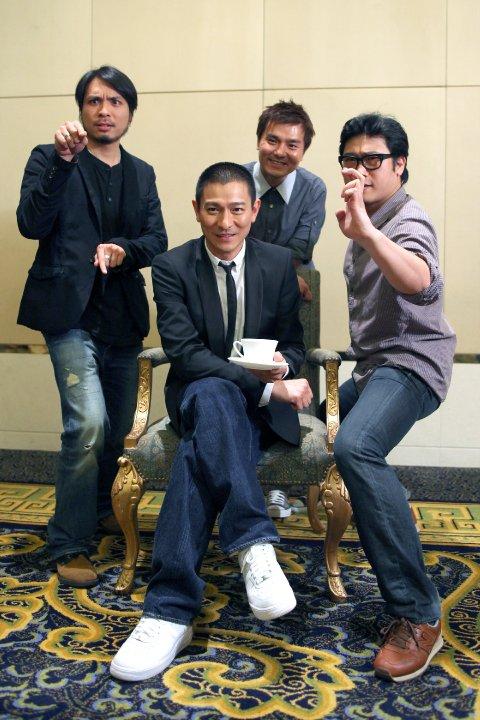 The Dream Team:Clement Cheng,Andy Lau,Gordon Lam Ka-tung&Derek Kwok.
FA: And how was Lam Ka-tung involved?
The Dream Team:Clement Cheng,Andy Lau,Gordon Lam Ka-tung&Derek Kwok.
FA: And how was Lam Ka-tung involved?
CC: He was very much involved in the movie. He was involved in every single dialogue and every single shot. He has been helpful. Also, he is a first-time producer. Initially we needed a pretty long time to adjust to his style but eventually we got on good terms.
FA: He's a producer and an investor?
CC: He's a producer. He has to watch over the whole project. He is responsible for us, and for how the movie is going to turn out, and to present to his boss, who is Mr. Lau. So he's involved a lot.
FA: The credits are a pure tribute to the Shaw Brothers movies. The names of the characters are appearing in the middle of the movie. Even the chicken, which is really funny. Where did that come from?
CC: (laughs) Initially it was salted fish. A dry, preserved fish.
FA: Can you explain the meaning?
CC: There is a dialogue in " Shaolin Soccer" when Stephen Chow talks to his senior Wong Yat-feyi in a nightclub. He says, "If you don't have hope in your life, you're like a salted fish." You've seen a preserved fish. It's all dried up and stinky and nobody wants it. Initially we wanted that thing to represent Teddy, physically. In Cantonese haahm yu, which means salted fish, also means dead corpse. So there's a parallel. We wanted to have one of those fish hanging beside him. But then we thought that the salted fish has come up in movies many, many times. What else can it be? Something more original. We came up with a preserved duck. In Cantonese, preserved duck is laap ngaap. It sounds very similar to laap saap, which means garbage. So there's a parallel. When we thought of the duck, naturally the chicken scene came up (laughs).
FA: What did you think about the audience reaction to "Gallants" at the HKIFF [three months before the theatrical release]?
CC: I was very thrilled to have such a good reaction from people. We know that we like it very much but we don't know how other people will react to it. That gave us a lot of encouragement. But then again, it's a film festival. People who buy tickets at film festivals are more willing to be enthusiastic about watching a movie. So we're not sure. Still, it was very encouraging to us.
FA: How was the budget, compared to "The Pye Dog" and "The Moss"?
CC: It was almost the same. Around five million Hong Kong Dollars.
FA: What was the most memorable scene for you? You'll say "all of them", right?
CC: (laughs) I'll have to say all of them! Because it was such a short period of time, and it was really intensive. We were racing against time and money. Every scene has its own special meaning and its own special experience to me. But I would say the happiest, most fun scene for Derek and I while shooting the movie was at the beach. With the kids and Chen Kuan-tai and Bruce Leung running on the beach. They took off their pants and took a piss. That's the fun part. When we wrote it, it was supposed to be sunny. The forecast kept saying it would be sunny, but it kept raining. There was a typhoon that day and we couldn't wait until the sun came out, so Bruce Leung and Chen Kuan-tai said, "Don't worry about it, we'll just run in the rain." At the end we thought it gave a different dimension to that scene. In all the other movies, they run in sunny weather. We're different. It gave it a new dimension because even though it was raining and bad conditions, we can still survive and do what we want. No one can stop us. That's the spirit that those two actors gave us. That day was the most fun we had.
FA: What is your next project?
CC: I have to finish the post-production for " Merry Go Round". I co-directed with Yan-yan and wrote it.
FA: So you are working like crazy?
CC: Very crazy.
FA: You usually work with Derek Kwok. And you worked with somebody else. How did it go?
CC: It was a very pleasant experience. I know Derek very well and we share similar visions. Our styles are kind of the same. Very close, except that he is darker than I am. Maybe I'm a more optimistic person. If you've noticed, compared to " The Moss" and " The Pye Dog", this movie is more sunshine-y. It's more positive. Derek worked with Yan-yan before. I consider myself a director who wants to communicate with the audience. With everybody. First and foremost, movies are for entertainment. Nothing overwhelms that. The artistic or social responsibility aspects, nothing outshines the entertainment aspect of movies. People just want to go in and have fun. If they're not enjoying it, they won't listen to you. Yan-yan is an artistic director. She is kind of like an arthouse film director. This time she wanted to do something different.
FA: Co-directing is...
CC: A very sensitive thing (laughs). I offer what I can and she offers what she can. My goal is to try new things. I've been working with Derek for so long. It actually overlapped " Gallants". When she approached me, she wanted me to help her co-direct. She wanted to be closer to the audience and not too artistic, a bit more mainstream. I guess my mission was that. My other challenge was that I had to write the script in four days. She approached me in October. I was working on the post-production for " Gallants" and I didn't have time. From December 20th to the 24th I had to finish the script because we started filming on December 27th.
FA: It seems very well shot and prepared.
CC: It was not very well prepared; definitely not (laughs).
FA: All the shots seem very sophisticated. How could you do it?
CC: Thanks to our director of photography. Jason Kwan, who also did the movie " Love in a Puff" [directed by Pang Ho-cheung], was a great help to us. Yan-yan is much more a visual director. She did a lot of music videos. I'm a very story-driven person, so Yan-yan made a lot of contribution to the visual aspect, as well as our director of photography. I just said, "I want this," and he gave me a lot more. This is how we cooperated. I don't know; I just want to try new things. I've tried "commercial" movies, comedies, kung fu and tragedies. Something more uplifting, I guess. With more historic content about Hong Kong. I would like to know how other directors work, and if the chance comes I will say yes.
FA: After that, what will you do?
CC: There are several projects and ideas that I have had for a very long time. First, I have to take a very long vacation (laughs). Maybe six months. Just to calm down because it's been really crazy for the past eight months. Then I have to see which story or idea I want to develop. There is one movie I really want to do from the Shaw Brothers era, a superhero movie. In Chinese it's called " The Chinese Superman". With Danny Lee Sau-yin.
FA: "Inframan"?
CC: Yes, " Inframan"! I want to do something like that. In the same spirit. Maybe a remake, I don't know. I'm still developing it. And the Shaw version of " King Kong", " Mighty Peking Man". That's what I want to do. I want to do " Inframan" plus " Mighty Peking Man" with people speaking Chinese when filming, and then dub it in English. Seriously, this is what I want to do. I don't know if anybody would pay for it but I really, really want to do it! Entertainment, right? I don't know if anybody would like it, but I like it. Of course I'd have to develop a really serious plot so that when people do stupid stuff, you still feel for them. This is not a laughing matter. People will laugh with the story and the characters but I would also like them to cry with it.
FA: As a Hong Kong director, have you thought about the Chinese market?
CC: I don't know, it seems like everybody is talking about the Chinese market and how it's going to be the next big world market. Plus, they have really big restrictions on the kinds of films they want made. Peter Ho-sun Chan has said that people are always complaining about restrictions by Chinese investors in Hong Kong but it's the same thing in Hollywood. If a big studio in Hollywood pays you to do a really big budget film, you will comply to any condition they offer you. I don't think this is different. I don't particularly want to make or write films for the Chinese market. I write films for film-goers who love movies. If I want to watch something, I believe that somewhere else in the world other people want to watch it too. If I could only convince an investor. That's the hard part.
End of part 2. Interview conducted by Frédéric Ambroisine in Hong Kong (March 2010) and edited by Sylvia Rorem (Jan. 2011). Cross-published on Twitch.
" Gallants" promotional photos courtesy of Focus Films. Check out " Gallants" Official Facebook Page.